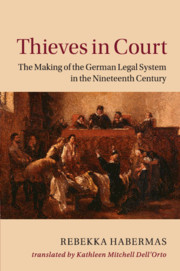Book contents
- Frontmatter
- Dedication
- Contents
- Acknowledgments
- Introduction: Questions Regarding Thieves, Reformers, Jurists, and Others
- PART I WHAT IS THEFT: QUESTIONS REGARDING THIEVES AND JURISTS – QUESTIONS REGARDING HONOR AND PROPERTY
- PART II HOW LAW IS MADE: EVIDENCE PRODUCTION
- PART III IN THE COURTROOM, OR WHAT IS LAW?
- 7 Reforms for More Legal Equality, Justice, and Public Openness?
- 8 The Meaninglessness of Jury Courts for Justice
- 9 Legitimation through Procedure
- 10 Irritations, Dissonances, and Various Other Matters: More Than Just Theater
- Conclusion: The Making of the Modern Legal System – Thieves and Property
- Relevant Laws
- Bibliography
- Index
10 - Irritations, Dissonances, and Various Other Matters: More Than Just Theater
from PART III - IN THE COURTROOM, OR WHAT IS LAW?
Published online by Cambridge University Press: 18 November 2016
- Frontmatter
- Dedication
- Contents
- Acknowledgments
- Introduction: Questions Regarding Thieves, Reformers, Jurists, and Others
- PART I WHAT IS THEFT: QUESTIONS REGARDING THIEVES AND JURISTS – QUESTIONS REGARDING HONOR AND PROPERTY
- PART II HOW LAW IS MADE: EVIDENCE PRODUCTION
- PART III IN THE COURTROOM, OR WHAT IS LAW?
- 7 Reforms for More Legal Equality, Justice, and Public Openness?
- 8 The Meaninglessness of Jury Courts for Justice
- 9 Legitimation through Procedure
- 10 Irritations, Dissonances, and Various Other Matters: More Than Just Theater
- Conclusion: The Making of the Modern Legal System – Thieves and Property
- Relevant Laws
- Bibliography
- Index
Summary
Let's summarize: The introduction of public, oral trials and especially Schwurgericht trials cannot be described simply as a linear increase in legal equality, certainty, and justice. The simple interpretation of legal reforms as a history of modernization proves to be the continuation of a deeply politicized legal debate of the nineteenth century. Many reforms which initially gave the impression that more control and thus less arbitrariness had come to the process of establishing justice and that the defendant's position had been strengthened, prove on closer examination to be less unambiguous changes. The Schwurgerichte thus played a much smaller role quantitatively than the attention generally paid them would suggest. The overwhelming majority of trials took place in overloaded lower courts that had to manage without jurors. The qualitative significance of Schwurgerichte – as well as of the public main trial overall – must be viewed in a more nuanced manner. Contemporary rhetoric and rituals endeavored successfully to present the public trial as the exclusive and above all, self-contained space for finding legal truth, which took place outside all spheres of influence. This impression was reinforced even more by the introduction of the public, jurors, and in a limited manner, the defense attorney. Yet the importance of the preliminary investigation was great, as many interpretations and narratives originated specifically in this non-public segment of the process. In addition, it was evidently not really possible to introduce an alternative interpretation, another set of relationships, a different history with any success in the public, oral main trial. Did the staging of allegedly neutral spaces monitored by the public thus only lead to enhanced legitimacy of the state process for establishing justice? Was the preliminary investigation only “re-enacted” in the main trial, as Jäger maintained in 1855 about jury courts? He remained for the most part alone in his criticism of the new court proceedings – not until some years later was that question discussed by broader jurist circles in the course of creating the Kaiserreich's code of criminal procedure. Was the main trial just rehashing truths that had already been produced previously?
- Type
- Chapter
- Information
- Thieves in CourtThe Making of the German Legal System in the Nineteenth Century, pp. 244 - 280Publisher: Cambridge University PressPrint publication year: 2016



